Text
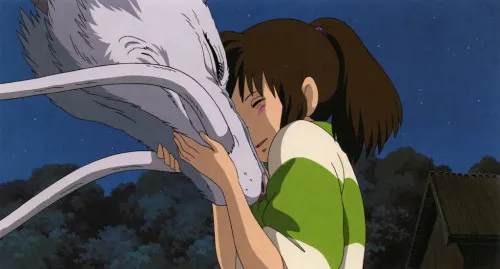
It's not a Miyazaki film if there isn't allusions to capitalism, destruction of the environment, identity, growth, and change. And we love him for it immensely.
It's easy to think of movies like Spirited Away as nothing more than a kid's movie, but time and again powerful messages are hidden within Miyazaki's work, really making you question why animated media gets so trivialized.
I'm a Ghibli dork, I love it. While Spirited Away isn't even in my top 3 (tbh not even my top 5. I only really like the sprites and No Face...) of their movies, it's still such an important film that touches on a lot of incredible emotions. The fear of change that Chiihiro feels at the beginning is spot on to what a young child who has been uprooted is likely to feel. She's in an unknown place with unknown surroundings, it's not a surprise she freaks out the way she does. The most major aspect of this film is how a child deals with their fears--their fear of being separated from her parents, of growing up, of change, of figuring out who they are. Because identity is massive in this film. I mean, hello, there's a whole ass character named No Face. Yubaba literally steals aspects of their names, and it's Chiihiro's growth that allows her to take back her (and Haku's) identities and reclaim them. She gains confidence and autonomy by doing this. This, I feel, everyone can see in this film. It's pretty heavy handed.
Capitalism is throughout pretty much every Miyazaki film (as far as I've noticed) and this movie has it in abundance. I mean, they work in bathhouse, slaving away to the point they no longer have an identity. She has to beg for work to survive. The physical laborer's are literally hidden well beneath the lavish building they slave over. Also, hello, literal child labor? Even the clothes separate the working class from the elite--Yubaba is always lush and extravagant (while also being very ugly, a staple for Ghibli antagonists). The uniformity Chiihiro has to change into and hide her real clothes. The boiler rooms????? Hello????????? It puts a spot light on western industrialization and how dehumanizing and terrible it is. The mix of both Japanese and distinctly western influences just shows how they feel about the ever-expanding western capitalism influences into Japanese society--spoiling it and rotting it from the inside.
There is so much emphasis on over-consumption in this from the parents literally obsessively eating food they happen upon to No Face spouting their gold everywhere, the literal polluted river. The coal the sprites lug to keep the bathhouse going. The forever-baby indulging in their mom's attention and wealth with no thought to growing up or making an effort to be independent. Yubaba herself. There's so much of it.
Miyazaki is one that no one questions the greatness of, and for good reason. Dude is gifted. We still should've watched Howl's Moving Castle instead (but I know you like anti-capitalism, prof. Howls' has that too!!!!)
Recommendation: read the Howl's Moving Castle book series (trilogy?) it's very good.
2 notes
·
View notes
Text
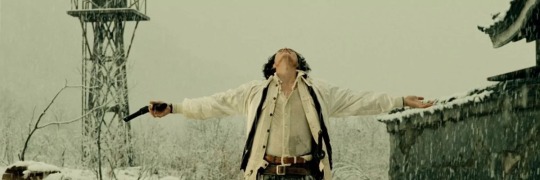
How very dare you give me a movie with the love of my life, apple of my eye, stars in my sky, etc and so on Oguri Shun and then you MURDER HIM!!!!!!!!! RUDE AS HELL!!!!!!!!!!!!!!!!!!
Despite that UTTER BETRAYAL AGAINST MY PERSON this film was actually insanely enjoyable and I didn’t think it would be. I’m not a fan of westerns typically unless there’s enough eye candy to keep my attention, and so many of them lean too far into racism and shit that I just. Pass. This, however, was a giant mishmash of so many different genres and tropes that it made it entertaining the whole time. I feel like the use of color is done so well here with highlighting the white and red but I might’ve missed most of it because parts of the film were very over saturated for me because of the tv I watched it on. But I love how for the boy or the “half breeds” it shows the mix of the colors. I mean, even after the death of her husband she’s still wearing pink. It’s subtle but always present.
I am obsessed with the use of such traditional American western vernacular used in this context because it’s so goofy but also somehow fits entirely???? I know I have a migraine but this feels like a damn fever dream in the best way. No hatman or spiders here. Pure vibes.
The set and costume dressing remind me so much of the 2000-whatever Romeo + Juliet with how they took something older and modernized it. Like, the costuming is LUSH I am OBSESSED. The fight choreography is AMAZING. It was goofy at times but not enough to take away the enjoyment because it was so well choreographed. I love gratuitous violence and this had it in ABUNDANCE. I know it’s a trope too but we could’ve done without the sexual assault. That was not so cool. Pretty bad actually.
The random comic book/Kill Bill bit in the middle was DELICIOUS.
This basically does nothing new for either the Samurai or western genres (which is typically why I don’t like westerns in the first place). I don’t think this has any particular point it’s trying to make except that it’s just fun. It’s like a “why not” movie. Almost like someone told the director they’re dumb for trying to make a (nearly) all Japanese cast do a western in full English. I feel like the title of the film is a play on this mishmash, too, because isn’t sukiyaki like a dish of just a bunch of stuff in a bowl? Could be entirely wrong on that front. It did also make me think of that netflix show High & Low (purely from looking at it because I haven’t had time to watch it yet).
This was just ridiculous but in the best way. And everyone is hot. Like. I’m sold.
I can’t believe this is the same director as Audition. Like this does NOT compute for me.
BUT OGURI SHUN!!!!!!!!!!!!!!!!! MY BOY!!!!!!! MY LOVE!!!!!!!!!!!!
HOW COULD YOU!!!!!!!
3 notes
·
View notes
Text
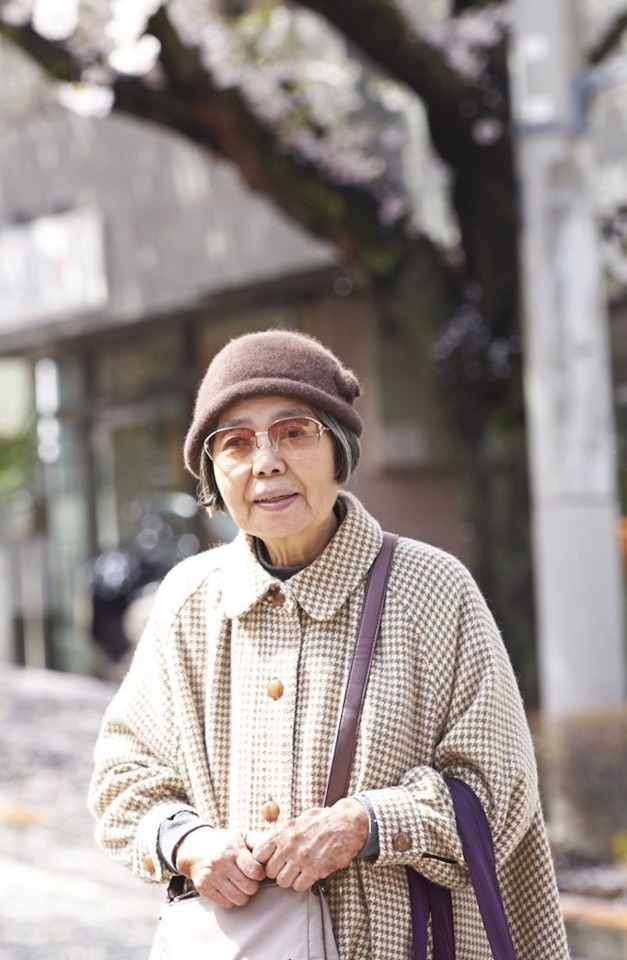
Sweet Bean as a movie is one that is pretty much set up against me. I don’t really like emotional movies that are supposed to just be heart wrenching or whatever, and I don’t really like old people.
I did enjoy this movie though. And I didn’t cry, purely out of spite!!! Because this movie is predictable. It’s every sundance movie ever made. Generic in its messaging.
The disability representation I appreciated. So many films, especially Japanese ones, tend to shy away from that or go the easy way out and I feel like this movie handled it respectfully. No one was made a joke or belittled (except for by the one shitty lady).
The motifs of trapped and confined are sprinkled through. I spoke about this in class (and yes my post is late. Forgive me I’ve had a migraine for three days and screens hurt) but it’s really well done showing off how closed and uncomfortable and dreary our lead guys life is until he learns how to love and appreciate things again. Seeing the bird cage be moved out of the trapped apartment, his own confinement of both the dorayaki shop and his own home being less stifling to more open at the sanatorium until eventually being out in the open among the cherry blossoms. It was beautifully done.
Like i said. Plot was generic. Predictable. It was okay. I wanna learn how to make the bean paste now.
0 notes
Text
Pulse Extra Credit
This movie is so painfully 2000s in a way that the original was not, even with the dial up noises. The heavy blue filter over the whole film is like every other horror movie that came out at this time. 2000s horror walked so Twilight could run.
Off the bat you know this film is not at all eerie or creepy like it's predecessor. You're immediately thrown into the story within minutes and seeing the first ghost, with a terrible jump scare that follows not long after. You don't even get the iconic static image glitch of the computer monitor until ten minutes in. The first suicide you only see in snippets (because American directors are cowards) and the ~ghost infection~ is weird black goopy veins/mold. Everything they chose to change completely removes any ominous or creeping feeling of dread and makes everything as diluted and washed out as the terrible blue filter.
One thing I did enjoy is the use of the ghost goop virus spreading through the chatrooms and text messages, because it just shows how rapidly that technology advanced during that time (and makes me feel incredibly old), but then that gets kinda dropped early on. Keeping the red tape was... a choice, as it didn't really fit the rest of the film with all the changes they made. There are no wide shots with that looming fear of what's hiding in the shadows. You could even wipe down the body goop imprints? Which seems so... idk. It makes the lasting consequences of the deaths seem less lasting.
A big difference is that it seems the ghosty boys take joy out of pulling people into their realm--this is highlighted with the professor at the beginning talking about things eating other things, so clearly this is like an attack more than an unfavorable consequence. The news spreads fast too, like anyone can do to stop it, which directly contradicts the whole premise of isolation and loneliness caused by the internet? Again, too, with some of the scenes they recreate in this just entirely lose their meaning. The media catches on an warns people fast, but they still chose to have the tv glitch with the brain cut off? STUPID!!!!!!!!!
It, almost at all times, shows you where the ghostie people are with weird ripply waves. Where is the unease!!! Stop showing me everything!!! Media literacy started dying in the 00s.
Man, I miss the contradictions and frustrations from the original because this was just BAD. Not even good bad. Just bad. And I've watched Devour (2005) like 10 times by choice. I know good-bad movies.
This is just Marilyn Manson ghfsdlkgfd.
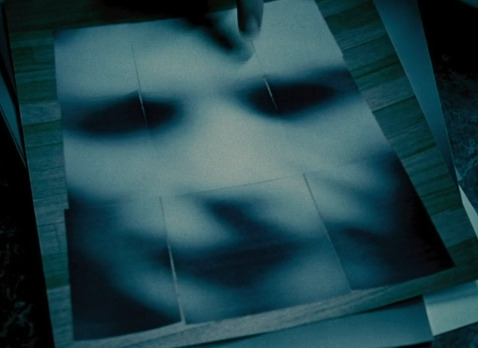
This movie was garbage.
0 notes
Text
I think you kind of nailed it at the end about it being foreboding, because a huge aspect of this film is both the inevitability and the inherent powerlessness of everyone. There's no way to stop the spread--both of the loneliness and isolation as well as the literal spread of the internet. Viruses spread faster the more you're connected, and weird ghost-computer virus hybrids are the same. There is no joy or good ending to this story and I think you're supposed to be aware of that fact by killing off the comedic relief.
Pulse
When watching Pulse, I kept asking myself what the message or idea was behind this movie, and it did a great job at addressing that throughout; however, there are occasional mixed signals. The message behind Pulse that the director had for the audience is that the internet is removing us from genuine human interactions. By doing so its causing everyone to be lonely and effectively become isolated in their own worlds, leading to the eventual death of their connections to humanity.
The movie establishes this idea from the very beginning when Ryosuke connects to the internet. He initially connects only to see others who are connected to the internet feeling alone. Their heads are down, and eventually, even one looks up to see the new soul who joined the system. All are connected, and all are alone. Every time we see ryosuke connect to the internet, he is met with this same sight, of individuals devoid of human connection. During the film, we even see the characters briefly talk about the effects of the internet and how, despite connecting people, the connections it makes are superficial and aren't meaningful like those found in reality.
As internet access is spreading more and more people are being labeled as missing. More are being subject to the isolation brought about by the internet and being ripped from genuine human connection. At the garden, it slowly creeps through, grabbing one person after another under the guise of being a ghost. One by one, people go to interact with a person lost to the "ghost" only for they themselves to discover the remains of their loved ones and become lost themselves. When they search for their loved ones, what they find in their search is the internet. They, too, become exposed, becoming lost to its pull.
In the end, we find that everybody is gone as the reach of the internet has become nearly global, and the only safe spot is reportedly in South Africa. This makes sense because South Africa is generally known to be behind in comparison to the rest of the world in terms of modernization. The internet's reach, while vast, is still impeded by South Africa's lack of access. The thing that is confusing here, though, is how the captain of the ship mentions that there is a signal coming from South Africa indicating its safety. Assuming that this movie is related to the expansion of the internet and the death of human connection, using a signal as a medium for establishing the safety of an area seems like quite an odd choice by the director. The captain could have said he heard a rumor about it being safe, or even that the ghosts haven't been able to make it there yet, but he chooses to indicate it via a signal. It almost makes me wonder if that's the directors way of foreboding the spread to South Africa as well as the coming lack of security for the remaining protagonist.
5 notes
·
View notes
Text
I definitely agree with what you say and I think it's so obvious about how this director wanted us to read this film but I'd argue it's not entirely the internets fault. Because when the characters do get face-to-face human connection, some still succumb--or they seek out the ghost dude's and touch them and they get wall body print gooped, too. It's more like the internet just exacerbated a problem that was already happening, if that makes sense.
回路!
In Kiyoshi Kurosawa's 2001 horror film "Pulse" (known in Japanese as 回路かいろ "Kairo"), the internet isn't just a place to connect – it's a yawning abyss of loneliness, threatening to swallow any user whole. The story unfolds in Tokyo, the most populous and densely-packed city on the face of the Earth, yet where our characters feel utterly alone. This isolation fuels a supernatural horror unlike any other, where ghosts aren't confined to graveyards, but slither through the very cables promising connection.
Pulse follows several characters, their paths converging as a strange phenomenon grips the city. Many residents begin inexplicably taking their own lives, and those left behind are plagued by disturbing visions – pale, faceless figures appearing on computer screens. This imagery isn't just jump scares; it's a slow, creeping dread. The faces represent a surge of loneliness, a hollowness that spills out of the internet and into the real world.
Michi, a young woman working at a computer help desk, witnesses this firsthand. People call in, their voices laced with terror, describing the spectral encounters. The internet, supposed to bridge distances, has begun its transformation into the existential garbage disposal we know today. Meanwhile, Ryosuke, a hacker, stumbles upon a disturbing website promising a connection so complete, it erases your very existence. This website embodies the film's central fear: the internet as a Faustian bargain: it can connect you to anyone in the world instantaneously but at the cost of your sense of self and reality.
Kurosawa's cinematography is absolutely on point for the whole film. We see characters dwarfed by empty apartments, their faces illuminated by the cold glow of computer screens. The sterile hum of technology underscores the lack of human connection. The ghosts themselves are unsettling – distorted figures with vacant eyes, mirroring the emptiness they represent. The hollowness of their eyes showing clearly the yawning gap between reality and internet simulation they experienced before dying.
The film doesn't shy away from the dark side of human connection in the digital age. We see people using the internet for fleeting moments of intimacy in online chatrooms, only to be left feeling more isolated afterward. The characters yearn for connection, yet their attempts through technology only push them further away. Like a digital Chinese finger trap: the harder you try to force it, the worse you're stuck.
Pulse isn't a film that relies on gore or jump scares. It's a slow burn, a meditation on the anxieties of a hyper-connected world. It forces us to confront the chilling possibility that the very tool designed to bring us together might be driving us apart (honestly "might" isn't even necessary). Even today, the film feels eerily relevant. Social media can be a breeding ground for loneliness, with carefully curated online personas masking the emptiness underneath. A neologism for this phenomenon is "parasocial". Pulse serves as a stark reminder of the importance of face-to-face human connection in a world entirely dominated by screens. It's a film that will stay with me like Ghost in the Shell or Jin-Roh: The Wolf Brigade have.

3 notes
·
View notes
Text
I get the criticisms and they're very valid, but the budget and honestly, j-horror in general, doesn't tend to go to extremes when it comes to cosmetics. They do enough to get their point across, and I think that has its place here in this film because its not about Sadako specifically, but rather that your curiosity is gonna get you killed, actions have consequences etc. Could she have been creepier or grosser? Yeah, but I think she was freaky enough. If I saw that shit come out my tv I'd prob freak out regardless. America relies too much on cosmetics in some aspects that the story suffers (though not allows. I love practical effects)
Ring (Original)
So I really really love this movie. But that is because I am a huge nerd when it comes to horror movies and analog horror type films. So I might be ranting a bit about the cosmetic design and the different camera shots that were used so beautifully here.
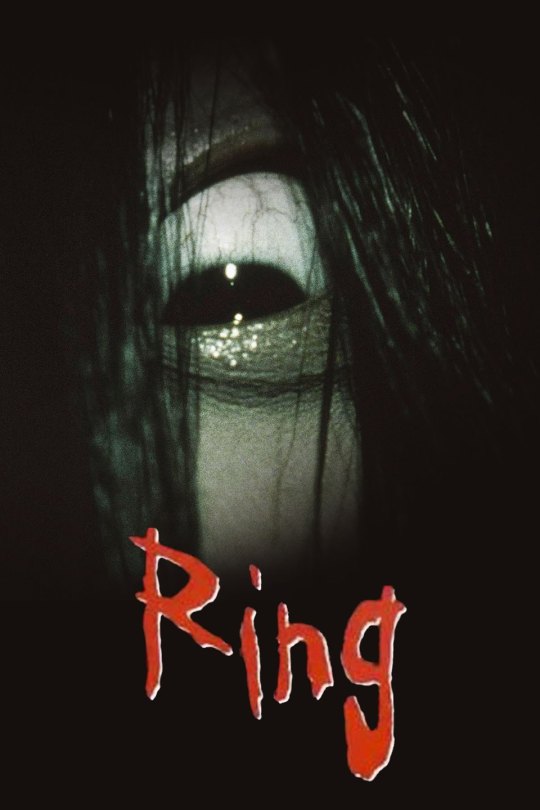
Some of my favorite horror scenes come from this movie. Two of the of ones that I love the most are the scene where the girl's corpse it found and the scene where they crawl out the tv. Despite, these scenes both having extremely good jump scares, what I want to talk about is the artistic choices done by the cosmetic team. One thing I very much enjoyed during the tv scene is how when she crawls across the floor, we can see the tips of her fingers bend as she presses them on the ground as she no longer has fingernails. Not only did the team did the research but also took the effort to make the scene as grotesque as possible to include this detail. Having also watched the American version of this movie, I was severely disappointed when the scene came and not only did they not show the nails being removed, they also didn't include the crawling bit so we didn't get to witness the bending of the fingers.
Now on to discussing the well scene. Before this scene, I was thinking how to corpse would probably be well preserved due to the environment its in and to my surprise, it was pretty well preserved. Once again, I have to give create to the cosmetic crew and story writers for including not only this detail but allowing us to witness all of the hair and remains shed off the skeleton once the main girl started touching it. Also, I have to give credit to the girl in this scene. She was able to portray her character as having lost her mind in a way that was calm and some-what heartwarming. All the stress that was previously on her faded away as soon as she found the body. When watching the American movie, I was extremely pissed when they chose to do this scene using CGI, I was even more livid that the actress was not able to express the same type of emotion.
Anyway, I didn't have much to talk about story wise about this. I genuinely can't find a thing I can personally analyze that wouldn't be stealing ideals off of other people.
2 notes
·
View notes
Text
In order for the Ring to hit as hard as it did in 98, you would unfortunately need to be born earlier or time travel. Chop, chop, get to work.
But yea, I agree that for a group setting, most things that would be unnerving or creepy wont hit as hard because the strength in numbers. I'm confused what you mean about the death availability, though, because it's pretty obvious death is gonna happen? Reiko just sucks and doesn't care, just cares about the story.
The Ring
The ring tells the thrilling story of one's memories and ill deeds from the past coming back to haunt not only them, but any who should come under the ire of the spirits wrath. I'm going to be honest, anything that I could come up with in terms of connections to Japanese society is pretty thin at best. People like horror because it gives them a thrill. Brings them out of their comfort zone and shocks them into a feeling of being alive even if that's through fear.
In comparison to modern day horror this film feels rather hollow. It attempts this slow build up to try and pull you into the fear, ticking down the days until your inevitable doom until you are hit with Sadako crawling out of the TV coming to... scare you to death? in retrospect that's kind of an odd way of killing people. In the movie we never see the entirety of Sadako's face, so it could be assumed that its her face being revealed that scares people to death, but for a horror film I feel like the cause of fear could have been developed stronger. The threat of torture, being eaten, used in weird and gross ways... there are a number of ways you can instill fear in someone, but the actual source of their fear is always really vague. The scenario where they are approached by Sadako crawling out of the TV is obviously enough to unsettle anyone, but what exactly is it that leads them to die? In the movie its suggested she has the power to stop peoples hearts, but again it seems to be from fear, at least when she is pursuing people in their homes.
I feel I should also continue by saying given that we watched it as a class it's hard to get absorbed into the horror element as much as one could have if they were alone in their house in the middle of the night. I feel like the setting in which you watch a movie, in conjunction with who you are watching the movie with makes a huge difference in its ability to inspire fear within you, but I feel like its psychological build-up left something to be desired, at least within a modern day audience. In modern days, there are several good examples of media that take good use of this slow creeping psychological terror. For example, the Amnesia games. It's constantly throwing uneasy situations at you and knowing that the monster could be there at any time is what brings the unease and this crippling feeling of "I don't want to continue". If the film wanted to create this true feeling of unease, I think it should have made the possibility of death available, and perhaps used the week timer as merely a sense of finality. You would die within 1 week rather than at the end of 1 week.
I've thrown a lot of shade at the movie, but I'm not really versed in pre 2000s horror. For its time it could be a masterpiece, I just don't have the context or knowledge to really elaborate on that. Overall, the movie was decent, I just felt like if it was remade today it could be a lot stronger in its approach.
2 notes
·
View notes
Text
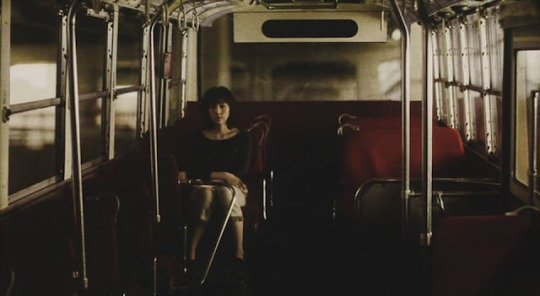
What an interesting premise that was terribly disappointing in execution. This is possibly going to be very critical, whoops.
The premise of Pulse is very fascinating. I love a good ghost story, or multi-dimensional story, especially when you tie in some aspects of tech-horror that this film has. And I do love a good apocalypse, especially a creeping one that you don't realize is happening until its too late. Those aspects of this film I appreciate. However, man what the hell.
So, clearly the conversation that this film is trying to tackle is about how the creation and ease of access of the internet is creating a worldwide epidemic of loneliness and isolation that is slowly killing the population. Not in any drastic way (though in some instances, yes, with the first death where he hangs himself) but in a looming, subtle sort of dissolving of sense of self. The people that get this... virus or whatever literally fade into surfaces and leave behind an imprint of the body. It acts like a computer virus--but it's really just highlighting what's already there. (In the case of Harue, who said she's always been alone. It's not a surprise she naturally turned to the internet/computer science to fill that void).
All of these aspects I genuinely enjoyed. The execution was dismal and confusing. I spent so much of the movie getting genuinely irritated by the logical leaps the people were making. Like, they would somehow immediately know things or suddenly forget important things, and it kept happening throughout the middle of the film that I was actually getting pissed off because it rapidly took me out of the story. Like the shit about the spirit realm being overwhelmed and having to come here, but then why are they making more spirits? Who aren't hanging around really all that much except for the few times someone hallucinates them? And then also it just wipes out everyone on the Earth? Stupid shit. Why did you bring up that random story if it has no relevance? Or is it related, and the message just got lost?
It had such a strong start, too, and even with the slow, creeping realization of what's going on, the end felt like the script writer got lost in his own sauce and forgot what story he was trying to tell. It became a weird jumbled mess that just repeatedly smashed you over the heat with a metal baseball bat about how terrible the internet is for society. Which like, totally valid, especially in 2001 but dude we get it. I got it the first 600 times you said it, I still get it now. I didn't get brain damage or alzheimer's in the last 20 minutes since you told me you were lonely.
Another positive I can give this film is the use of unease and discomfort of the use of shadows throughout this film. It was incredible. Possibly one of the best to do it, especially with all the people lurking (makes me think of Hereditary). I spent more time focusing on the background than the foreground, waiting to see what shadow was gonna move.
Another negative, this was so predictable. So, so, so predictable. Great idea. Mid execution.
Now, my theory is that the red used throughout is somehow the protector. Obviously, the red tape seals the door--but could it have been any tape? Probably, but they chose--and continued to choose--red. It is EVERYWHERE in this film. I think that's why our main girl survives. When shit starts really kicking off, she's always tied somehow to red, be it on her clothes or directly around her. Same with the loveable idiot Kawashima who wears his red hawaiian shirt until his dumbass changes to green and walks into that opened door.
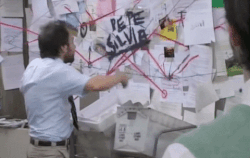
I love how bleak this movie is but I hate everything else.
4 notes
·
View notes
Text
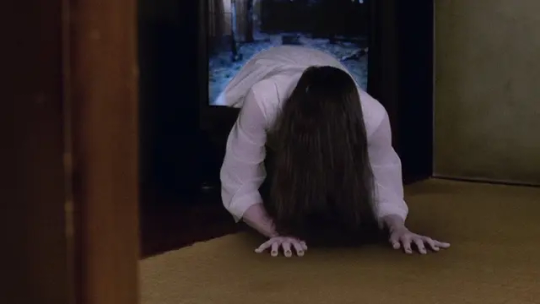
Finally J-Horror!!!!!!!!1111!1!!!!111!!!!!!!!!
I've seen this movie like a million bajillion times in my life, including all the remakes and the sequels, etc. so I am coming from a biased perspective for sure. However, this is the first time I'll try to actually analyze what I'm watching instead of just enjoying it.
The director utilizes a slow progression to really stress you out. So much of this film is faking you out for whats going to happen--the jump scares aren't utilized as actual jump scares of terror, but more mundane things with a sudden cut or noise. It does well showing a lot of the tragedy of the deaths off-screen or with those filter freeze frames. It can be a little goofy, but also its 90s horror and I eat that shit up. Even the ending, or what you think is the ending, is a fake out making you think that love and compassion and acceptance is what's going to lift this supposed curse when in reality, nope! It's actually perpetuating the cycle and pushing off the curse onto someone else to save your own skin.
I think it lends a lot into what Sadako's character is--a traumatized, abused little girl that has a scary ability and was ultimately killed simply for her existence. So many people were complicit in both the death of her and her mother, as well as the stress they had to deal with in life. Her anger is what fuels this curse and gives her the ability to utilize the 90s technology to punish, well, everyone.
The use of technology for this particular brand of horror is interesting, too, because in the 90s (esp 98 and the years leading up to Y2K [did Japan have a freak out about that too??]) a lot of people were stressed and scared of the rapid expansion of technology. You could argue that this film takes that stance or at least highlights what people were afraid of during this time, that television, movies and even phones can bring horror literally into your house if you aren't careful which is represented by Sadako infamously crawling out of the tv.
I love, too, that the story can be read from a feminist perspective as well. Both Sadako and Shizuko were mistreated by so many men in both of their lives and ultimately met their fates at the hands of men. It is then, interesting, that within our leads only that the man dies. Has nothing really to do with their actual intention, because Reiko was going to die regardless unless she copied the movie, but I digress. I can see how this analysis can be argued.
The American remakes definitely utilize more jump scares and out-right horror elements, but nothing beats the original feeling of dread and the fact that the fate can't entirely be escaped. The remakes also remove the Japanese soul and mythology tied to it and I think that's shitty.
I have more I could say, but I will cut this here for now. My girl Sadako never did anything wrong in her life.
4 notes
·
View notes
Text
Hmm, I would like clarification about your Icarus reference, because I don't see it. The story of Icarus is about ambition and disregarding the knowledge of the older generation (his father)--this doesn't really have that. If anything, it's the opposite. Ageha doesn't have an attachment to her biological family or to herself because of the fact of being of a Yentown. It isn't until she meets Glico and the rest that she develops herself and has the need for a name or even wants one. We go from the opening scene of her refusing to accept or claim her mother to claiming Feihong and the rest, even Glico to this random dude that saved her from an overdose and who might be a crime lord (whether she knows it or not). Ran, definitely not Icarus. Dude vibing. Glico, maybe? But she doesn't suffer that much of a fall once she becomes famous--and it wasn't even her ambition, it was Feihong's. He is the closest in this film who could be argued for this reference and I guess I could see it there, but his aspect (as much as I love him) isn't that monumental to the overall thing. They mourn him, and they burn the money and bury him, but they also move on because death is just apart of the Yentown lifestyle.
I could see how its a little bit about tearing communities apart but, again, that's a stretch to me? Because if anything its a group of people who never would've ever interacted are growing and working together, learning to love one another and fight for each other. If anything, it's the opposite. None of them are corrupted--again, except you could maybe argue Feihong. And then he pays for that corruption.
Iwai - Swallowtail Butterfly
This movie was a ride from beginning to end. I don't know if it was just my viewing experience, but I almost thought I was watching a series instead of a movie. This seemed to be another movie where vignettes or parts of a hole form to create an overall meaning to the film.
Figuring out an overall theme or message was a bit hard to figure out with the length and variety this film had to offer. But, if I had to say, I think Swallowtail Butterfly is a critique on ambitions power to corrupt people and tear communities apart. I think the obvious symbolism of this movie is not movie or yen itself, but how yen stands in for ambition. None of the characters truly seek to make the most yen they can, but to realize the wishes they so sought before but were not able to. The film then, presents us with an assemble cast of bizarre characters who seek to make yen, and in the process, forget about the community from which they came from. Once they realize that such a life is not truly worth it and that the yen has corrupted them, they return to the community. This can be likened to the squashed butterfly that Ageha saw in her childhood, a butterfly that, like Icarus of greek myth, tried to fly too high or sought an ambition to lofty, and forgot about the dangers it came with.
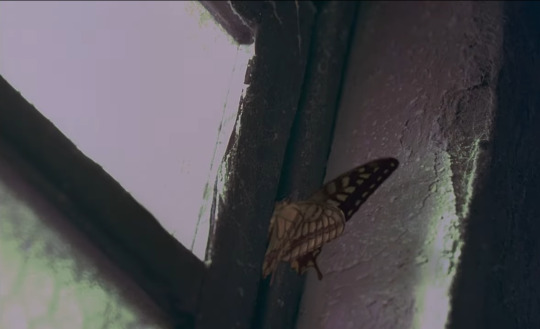
5 notes
·
View notes
Text
My theory about the yen being the strongest really isn't actually like, the truth. I think it's just the focus on immigration and that idea that one country is superior to others, especially when you think about how much of a capitalist powerhouse Japan is.
Swallowtail Butterfly
Overall, that was an interesting movie. I liked the premise of it being set in the future and how the world developed into a dystopia where one currency becomes the strongest, but at the same time I would have liked more backstory as to how the yen became the strongest. While it doesn’t have to be realistic or anything (being the dinar), some more background to the world building would be nice. Maybe if I read the book that it was based on, it would satisfy my questions. But anyways, I enjoyed the movie and especially the first part in which you really get immersed into Yentown. At the start, Ageha sees her mom, but chooses not to recognize her at the coroner, most likely because it would cost more to bury her, so they just choose to have the funeral right then and there. And on top of that, she gets taken advantage of by her “aunties” who take the rest of the money that her mom probably stashed away. It was really sad though, seeing Ageha struggle and be tossed around like she was nothing, being left with Glico without her actually wanting her at the start. Even Glico tries to give her to Fei Hong for a little bit probably because she wanted to get used to having someone to care for as well.

The story progresses with Ageha finally living a life with Fei Hong and Glico as almost like older siblings. One of my favorite scenes was with the black guy taking care of her as if he was his own child. I really liked how it showcased southern hospitality I guess you could call it, or just American hospitality in general. It was nice that they didn’t have any racial tension between the characters, even the white guy that was born in Japan and identified as Japanese was accepted by them, but then again now that I think about it, it was because they are all outcasts trying to make it into the world. The scene with them playing “My Way” was so good and it helps that it's one of my favorite artists too. The movie then turns into like an action movie with all the stuff surrounding the tape that was hidden in the person that they coincidentally killed. The fact that it had counterfeit material on it was pretty crazy to me. That fueled the fire behind everything; from Glico becoming a singer, Fei Hong getting into jail and then eventually dying, but also the return to the truth that they knew before, the return to family and the rejection of money.
1 note
·
View note
Text

Swallowtail was probably my favorite film we've seen so far for this class, and I'm so sad I hadn't seen this movie before.
It was a wild, batshit ride that I genuinely didn't know what was going to happen next (well, for the most part). It would've been so easy for Glico to do what the first lady did and sell our Ageha into prostitution, or leave her on the street to fend for herself. I love the message of found family in such tragic circumstances that is shown constantly throughout.
The biggest issue obviously is that a lot of this film leans into stereotypes a little too much, which could be out of ignorance or to a greater extent purposefully showing those stereotypes. (Black boxer, the group of immigrants that are scrounging and fighting for money, etc). What I loved, however, was how at the end when it really came down to it, the people that were so shocked at the casual disregard to the cash were the "real Japanese", not the immigrants, despite the fact that the whole film is about how the Japanese society shames and demeans the immigrants and shoves them into these ghettos because of their obsession with money.
It is also interesting that my green haired bestie is the only one from our main family to die, and I think that's because he did end up falling for the money (initially. At least he didn't give up his family).
Also, the choice of "My Way" is so on the nose, when you look at the lyrics. And the fact that its inherently a tragedy in some respect.
My boy Ran did nothing wrong ever in his life. I can genuinely say I enjoyed every aspect of this film.
Except, the tattoo scene. GIRL DON"T TOUCH THAT O M G!!!!!!!!!!!!!!!!!!!!!!!! Stressed me the hell out. I wanted to reach through the screen and smack her hand.
0 notes
Text
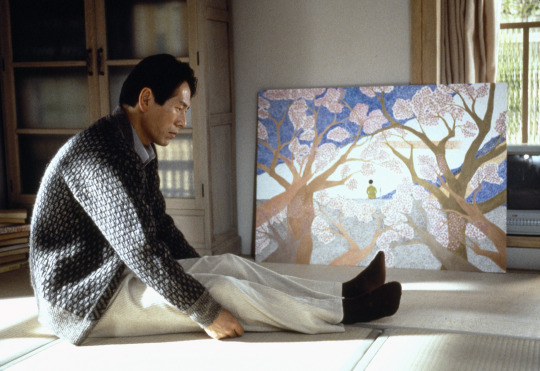
The poor attempt at silencing the gun at the beginning probably set the tone for how I would feel throughout this whole film, lmao.
I also like, couldn't take anyone seriously when they walked hunched over and like they were seconds from either puking or peeing themselves. Genuinely "mom i frowed up" the whole film. Why.
One thing that did strike me from the beginning that I liked is that our man Nishi is just straight up a shell of a person. He has no life behind his eyes, no movement to his body. He's quiet and still. Guarded both by the way he physically holds himself as well as the near ever-present sunglasses he wears. It doesn't give me the stereotypical "I'm a tough guy cop" vibe. More of a sad, sullen and void of a human type of energy. Dude is entirely disassociated from life. Considering the shit he's had to deal with, it makes sense. He's like if Nanami was old and not hot.
While I do like the choice of mostly orchestral music because it tends to add a lot more of the typical despair tone that I feel like this movie carries throughout, I also can't give it too much credit. Maybe I'm burned out, but I've heard better orchestral OSTs. I will also give it credit that it knew when to kick up and when to fade out and leave no background music. More modern movies tend to have music constantly telling us how we're supposed to feel. It is interesting to see this juxtaposition of these scenes with really heartfelt/heart-wrenching orchestral elevator music where Nishi is supposedly Feeling Emotions compared to the silence or loud bursts of noise during violence. Likely its a commentary of the emptiness violence has to offer--because it appears much of (if not Nishi's whole life) is filled with violence of a sort (cancer is a form of violence) and why he, himself, is empty.
So much of this film is just standing around with quick cuts to abrupt violence before going back to the silence. Intentional, yes, but used so repeatedly throughout that I had the same issue I had with Oharu--dried up my give-a-shit well about a quarter of the way through. By the middle of the film baby I was in a drought worse than California.
I liked the non-linear storytelling. I do think that was done well, I just don't care for the story. It's also interesting that such a lifeless character gave art supplies to the dude who got paralyzed as a way to like, help him come back to and express himself. That felt oddly humanist. Maybe there's a soul in that detached body somewhere. Or maybe that was his way of like trying to kickstart himself into becoming a real boy again. It also felt like each painting foreshadowed what was about to happen in said scene--at least the one's they put more emphasis on.
One scene I think is particularly rude as hell is when she's watering the picked flowers and Mr. Buzzkill over here is saying its no use watering dead flowers like she herself isn't the physical manifestation of plucked wildflowers that are dead or dying. She still deserves to be watered, you prick.
Blood doesn't do that.
3 notes
·
View notes
Text
I agree!! I hate his parents!!! I don't see why people are so forgiving towards them. Yes, the boxing has a use and is intentional and helps Sugihara to defend himself but it's still!!!!!!! abuse!!!!!!!!!!!!!!!!!!!! He was and is a child!!!!!!!!!!!!!!!!!!!!!!!!!!!! And mom what are you doing!!!!!!
Go
Being unable to fit into the people around you is an emotion and experience that everyone, at one point or another, has experienced. However, being actively shunned by the country you're living in and by the people in that country, as well as constantly being watched by the people apart of "your society" is a little more intense.
I knew about North Korean schools in Japan for quite a while, and I also knew that many people in Japan find these schools to be backwards thinking, however I never considered the students and how they felt about these schools and the people who teach and run them. Many of the students at the school in this film have to suffer the mental dichotomy of following their families (and schools) wishes of following in their heritage, while also having to struggle through the advancement of society and technology in the actual country they are living in. Having to choose between two sides that both actively don't care about the individual is a seemingly impossible decision to make.
Sugihara is one of the most realistic depictions of a teenager I've seen thus far in the films we have reviewed in this class. "Family Game," while very fun and still one of my favorite movies of all time, does not really characterize the teens in the film to the same degree that "Go" does. Sugihara's reactions and decisions seem fairly similar to decisions I had made as a teenager (albeit to a different extent.) When he chooses to tell his lady that he's Korean, when he plays light the decisions he makes with his father behind the glass (like when he gives the peace sign) all seem like actions a real teenager in that situation would make, so it feels like real interactions.
I really still don't like his parents, even though I do understand they were doing their best. (the fight with the taxi driver was kinda awesome though)
1 note
·
View note
Text
I like that you mention that its sort of difficult to really feel empathetic because of their delinquent status but it also feels surface level--that's how everyone in the film treats him. Without realizing that those actions are brought out of him due to oppression. I'm glad they made the girlfriend racist (what a sentence) because it feels more realistic--it's just how Japan is sometimes. I feel like it would've been too ooey-gooey romcom if the director made her instantly accepting. Even if the ending is still ambiguously happy.
Go Blog
Now this is certainly a movie. Go is a progressive paradox being trapped between a trance, MTV-like aesthetic and a socially important message. Graphic bouts of violence and a father/son fisticuffs break the interface of this ideally constructed narrative. At times, they remain darkly comedic. At others, they entice moments of shock. From what I’ve heard, this is the only Japanese film to deal with North Korean residents in Japan. The story explores the odyssey of its North Korean main character Sugihara in a very poignant and respectful manner. You feel bad for his plight as he is stuck between two disparaging worlds and chooses to be a blip among everyone’s radar.
“I’ll give up being me, I’m a fucking question mark”
It’s this characteristic that adds layers to the overarching youth plot. Their dangerous antics are captured on full display. At points, it’s hard to root for them because they’re all deviants. Sugihari fills this void with his relatability, and often, finds himself rebelliously changing in unexpected ways throughout the film. His love story with the Japanese girl showcases great amounts about the racial attitudes around then. It goes smoothly as much as perfectly paired rebellious youth would. However, once Sugihari’s nationality comes into question; it’s his girlfriend’s racist attitudes that are most heartbreaking. Thankfully, this has a happy ending, alongside a graphically one-sided knockout between him and his dad.
1 note
·
View note
Text

Vibrating at frequencies not even seen by shrimp!! We are finally in the 00s !!! My era for Japanese media!!!!!!!!!!!!!!!!!!!!!!!!!!!! I'm sad to say I haven't come across this movie before but my girl from Battle Royale is in here!!!!!!!!!!!!!!! LFG!!!!!!
Seeing that this movie was about a Japan-born Korean (half-Japanese, half-Korean? I can't tell which) not gonna lie, scared me a bit. Japan's history when it comes to Korea is really gross and awful and when they portray Koreans in their media it's like. Almost never good. This is better than most but its portrayal is still a bit...

I think it does well showing a lot of what Koreans have to deal with being in Japan, at least. Which a lot of people probably think is over-dramatized and I can imagine a lot of the Japanese population didn't like that light being shown on them but also like.... some of y'all...... were not great!!!! But also it felt like they leaned a little too hard into some of the ~Korean men aggression~ stereotypes, just a smidge. Also, the bit with the kid speaking in Japanese and saying the Korean wasn't right. Just.... eh. Did my sweet boy Jeong-Il dirty asf, too.
I love the use of flashbacks only at certain points to introduce characters or explain things, but also not everything is immediately explained. It allows you to fully immerse yourself within the story Sugihara is trying to tell you.
Identity is a huge factor of this film. Throughout you deal with Sugihara's struggle himself for how he fits into both Japanese society as a whole as well as Japanese youth society--but he's also growing up at a time of a lot of quick innovation and change. He consumes a lot of revolutionary media--likely because he's got so much turmoil and anger inside from the constant abuse of his father. His father, too, struggles with his identity and even outright denies it. Even our leading lady hides her first name (because it's "too Japanese" ????)
His father is extremely angry and abusive, likely entirely because of the past trauma he has from North Korea, and he does physically abuse his son. That's not to be argued. But the motives behind why he does, in a sense, are pure. Just twisted and warped. He knows that Japanese society rejects them and he gives him the tools necessary to defend himself in a world that wont defend him--we see this proven on the train station when the only person who stands up to the Korean girl is Jeong-Il (and while he lays there dying, no one helps).
It's obviously another retelling of Romeo and Juliet because he's Korean and she's Japanese, blah blah blah. They also constantly reference the rose by any other name line so it really beats you over the head with that. This also immediately ties right back into sense of identity because it's literally about names--and both Sugihara and Sakurai hide theirs.
I really think this is less about the actual love story between Sugihara and Sakurai, because he fits as an unreliable narrator in a sense. I think its more about him coming to terms to who he is as a person, but its projected in a sense into this love of a girl. This is reinforced when he meets up with Sakurai again and makes sure to demand she say what he is. and has his tangent about who he is. ("I'm a question mark" personally resonates with me). I actually prefer that aspect of this movie, because the romance trope (to me) is overplayed.
If you like the fights that Sugihara got in, might I recommend Weak Hero Class.
4 notes
·
View notes